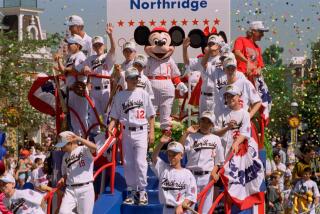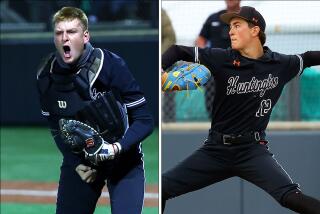A Small Town Bat-Maker Becomes a Big League Hit
- Share via
JEFFERSONVILLE, N.Y. — In this small town nestled among the white ash trees of the Catskill Mountains, Stanley Oliver handcrafts big-league dreams.
Oliver makes baseball bats for a living. For years, he’s spent up to 16 hours a day working in his small shed next to the slow-moving Calicoon Creek, trying to perfect his wooden wares.
Oliver, or at least his bats, have finally made it to the majors.
Want to see what one can do? Watch National League rookie of the year front-runner Scott Rolen hit balls beyond the fences for the Philadelphia Phillies. Or catch highlights of the St. Louis Cardinals’ Brian Jordan clubbing a grand slam and a two-run homer in the same game last year against the Chicago Cubs.
Orders for the bats are coming in from around the country, including from Syd Thrift, director of player personnel for the Baltimore Orioles.
Just don’t tell Oliver he’s competition for Louisville Sluggers or Rawlings bats.
“I don’t think those big bat companies even know I exist,” Oliver says. “I’m just a guy cutting bats by a stream.”
The small-town charm, as well as the bats, appear to be winning over professional and sandlot ballplayers slowly but steadily.
“When I first started, a lot of people asked--’Who’s going to buy these?’--and had doubts if even a Little Leaguer would use them,” Oliver says as he stacks a group of freshly made, rose-colored bats. “I hope what I’m doing is needed for the game.”
The 40-year-old Oliver got his start in his native Joplin, Mo., where he grew up watching his uncle, Ken Boyer, play third base for the St. Louis Cardinals. He moved to Chester in 1980 to work for a company that makes cables for the military, and then to Jeffersonville in 1986.
It was amid the lush green of the Catskill Mountains that he combined interests in woodworking and baseball and made his first bats. Some of those original creations went to the company softball team.
“They were my guinea pigs,” Oliver says with a chuckle. One of those bats hangs from the ceiling of his shed, serving as a reminder of how far he’s come. “Those first bats looked like a club.”
Refining his skills over the years, Oliver gained more confidence, and in 1995 he quit his job and opened the Catskill Bat Company.
Gradually, word spread about Oliver’s creations, which sell for between $25 to $30, and he landed deals with minor league teams such as the Elmira Pioneers.
Next came road trips to minor league ballparks around New York, where Oliver would set up shop and sell bats to fans while letting players take free swings.
“I thought I was in the major leagues by then,” Oliver says. “I thought that was as far as you could go.”
He was wrong. Oliver’s bats made it into Jordan’s and Ozzie Smith’s hands for the Cardinals’ playoff run last fall. Rolen started using them to try to get out of a slump earlier this season.
“Stan came up to me in batting practice . . . and asked me if I would like to try them,” Rolen said. Within hours, he blasted a homer off the Dodgers’ Hideo Nomo.
“The bats are custom-made and the wood is great,” said Rolen, who is on a pace to hit at least 20 home runs and 90 RBIs.
At the heart of Oliver’s business aren’t the big league sluggers, he says, but the kids who buy his bats, preferring them over aluminum.
Oliver uses the same high-quality wood in the bats he sells to youths as the ones he sells to the majors “because the pros need these kids to be aware of what wood is.”
“I go by what the ballplayers tell me--the metal bats hurt pitching,” he says.
In the meantime, business is brisk at the Catskill Bat Company. Oliver has a hard time keeping up with the orders and thinks he soon will have to hire full-time help.
“People underestimate the quality of the work and resources in the Catskills,” Oliver says. “You combine the two things and you end up with a great bat.”
More to Read
Go beyond the scoreboard
Get the latest on L.A.'s teams in the daily Sports Report newsletter.
You may occasionally receive promotional content from the Los Angeles Times.










